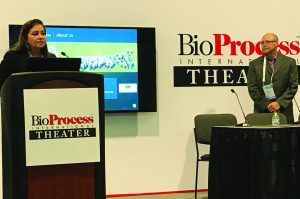Molly McGlaughlin, director of strategy and business development, BioVectra
Jim Stout, director of process science, BioVectra
McGlaughlin introduced BioVectra. The company has been in business for 45 years and is based in Canada. Its a well-established contract development and manufacturing organization (CDMO) and fine-chemical manufacturer, and is a subsidiary of Mallinckrodt Pharmaceuticals. BioVectra started out as diagnostic reagent company and now has a complementary set of niche capabilities. From 10 years of fermentation experience, it was a logical progression to the fermentation of biologics.
In Windsor, Nova Scotia, BioVectra is building a modern microbial biologics facility that can develop biopharmaceuticals from cell lines to filing of biologics license applications (BLA). It will be equipped to work with a range of biosafety level-one expression systems and manufacture proteins, enzymes, antibody fragments, peptides, and attenuated virus vaccines. In response to client demand, the original plan to renovate an existing facility has expanded into building a full-service biologics facility with surrounding available space for expansion. Installation and full validation are scheduled to be completed in the autumn of 2018. The facility will incorporate stainless steel fermentation and harvest tanks, modular cleanrooms, disposable-equipment technologies, in-line dilution and controls, high-throughput systems for process development, and modern platform technology. McGlaughlin highlighted construction milestones and equipment installation with a series of illustrative slides.
Stout described the phase 1 floor plan and capabilities of the blended-hybrid facility. It houses two 17,000-L fermentation tanks for microbial fermentation. The site has four downstream purification suites that are designed as modular cleanrooms. The company will be able to perform protein modifications as needed. In phase 2, which is projected for 2019, clinical manufacturing suites will be coming online, process development laboratories will be set up, cell-line development areas will be ready, and the company will be bringing onboard platform technology. BioVectra will be preparing its own buffers for use in the facility. Large and small production batches will be possible. Single-use technologies will be used wherever possible to augment the steel tanks, traditional chromatography columns, and filter housings. For complicated and customized production processes, equipment will be able to be moved around and in and out of rooms as needed. BioVectra will match its upstream productivity to downstream capabilities, tune the conditions and equipment to work well together, and optimize productivity.
BioVectra will use flexible manufacturing to augment its traditional facility. This will add complete flexibility, both for upstream and downstream processes. It will allow for scale-up into large stainless steel tanks or scale-out by duplicating disposable equipment trains. The company also will diminish the risk of contamination through use of disposables. In the future, it will move toward incorporating developing technologies. For example, membrane chromatography columns might replace resin chromatography columns. The company also plans to add mammalian cell manufacturing capability within its flexible manufacturing unit.
BioVectra’s platform approaches will establish good productivity for proteins through both yield and stability. With a platform, you can predict timelines and increase stability and purity of your product. Developing a thorough understanding of your process will lead to higher product quality and rapid results.

